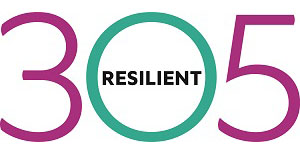The Resilient305 Collaborative is a joint academic-government research partnership among Florida International University (FIU), Miami-Dade College (MDC), University of Miami (UM), and government and non-government organization (NGO) leaders of GM&B. The Collaborative began in 2016 as an outcome of the MetroLab Network and was created to work together in support of comprehensive resilience research and learning. Within the universities, the team includes faculty across disciplines of physical, environmental, and social sciences, including public and mental health, information technology, communications, disaster risk management, engineering, architecture, planning, and education.
The Collaborative is piloting a research strategy, focused on an area of GM&B dubbed the “Little River to North Beach Resilience District.” This diverse area spans communities with varying degrees of exposure to natural hazards, socioeconomic conditions, and technological capacities. The research strategy will help quantify the benefits and investments resulting from ongoing programs and policies identified in the Resilient305 Strategy. To support this work, the Collaborative received seed funding from Miami-Dade County, submitted a Phase 1 planning grant to the National Science Foundation Civic Innovation Challenge, and is pursuing support from other federal agencies and philanthropic organizations. Lessons learned from this project will be leveraged to report on and enhance resilience outcomes and cross-sectoral benefits of Resilient305 actions, develop new information to improve the translation of the Resilient305 Strategy to help meet resilience priorities of the community, and replicate the research strategy in other areas throughout GM&B.

